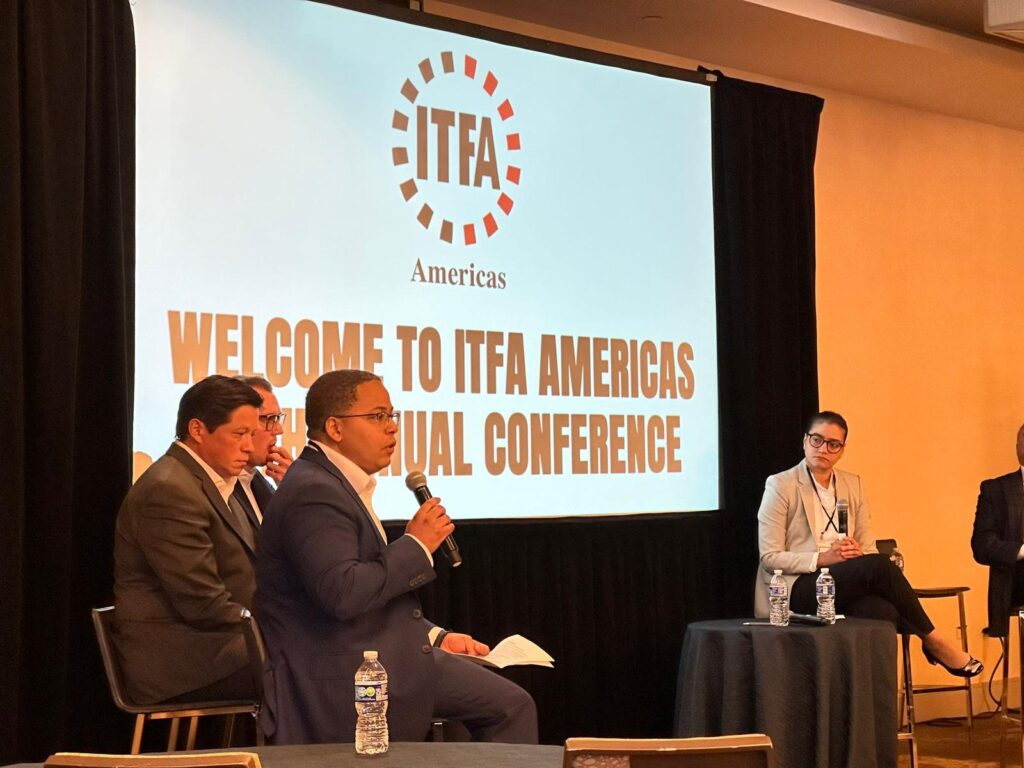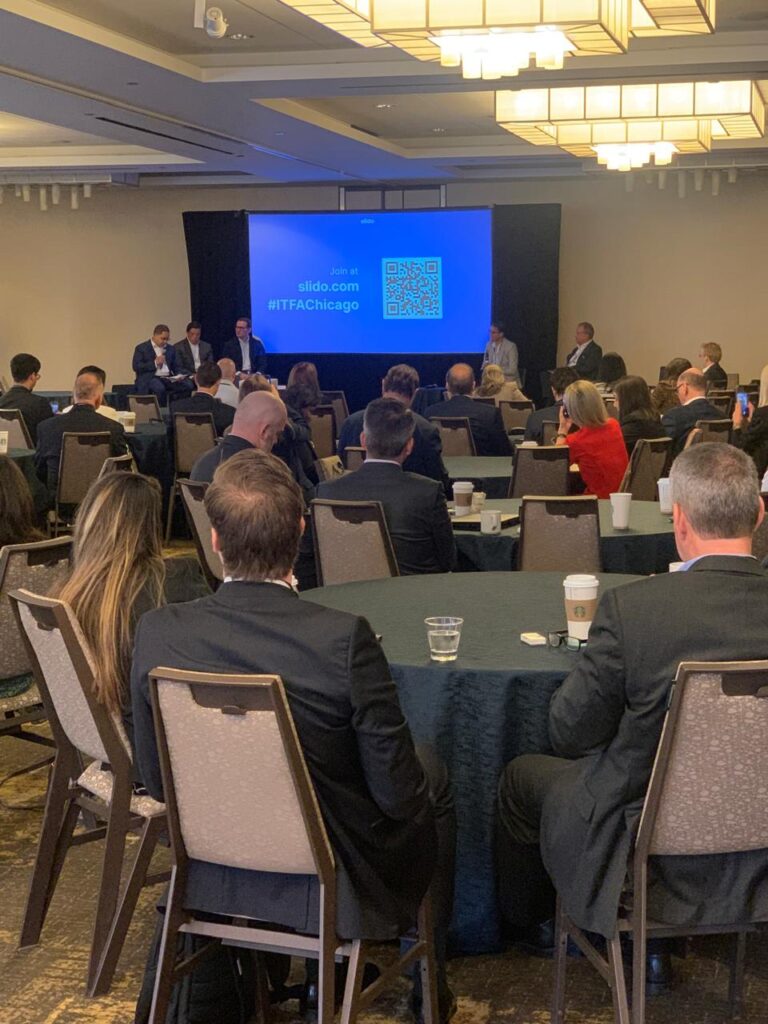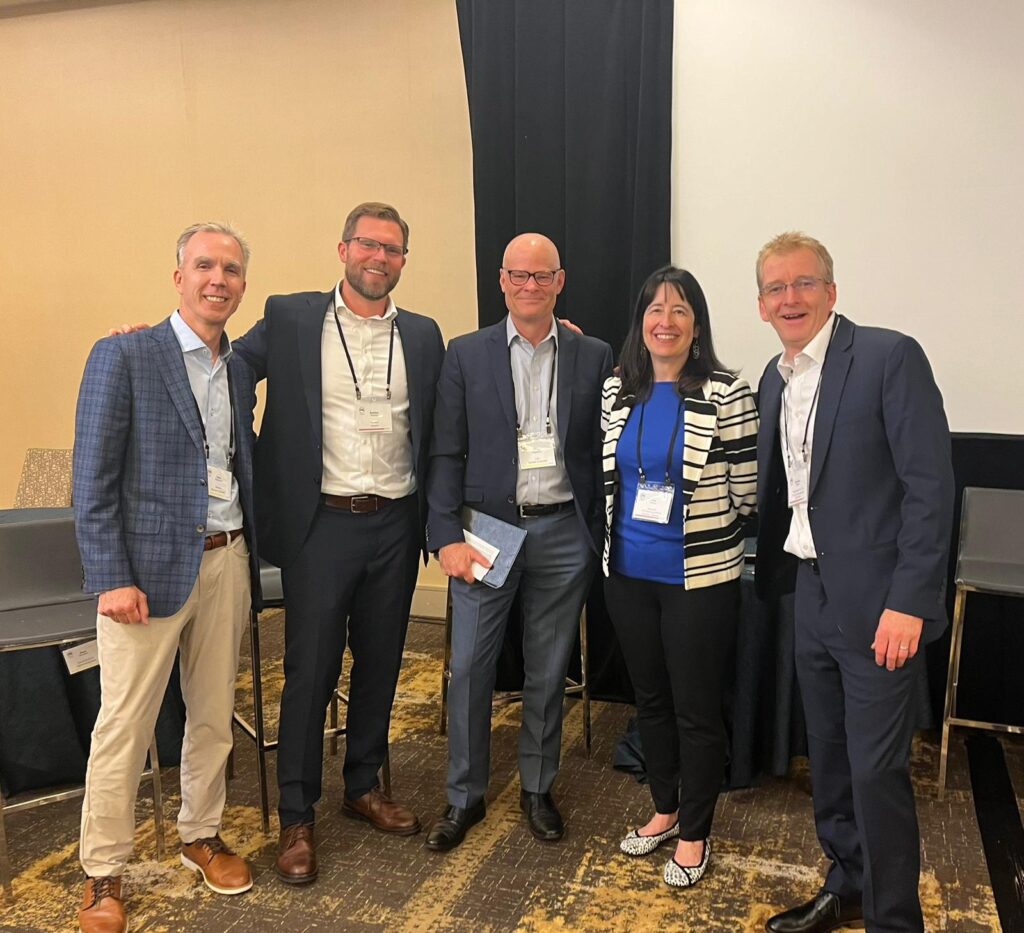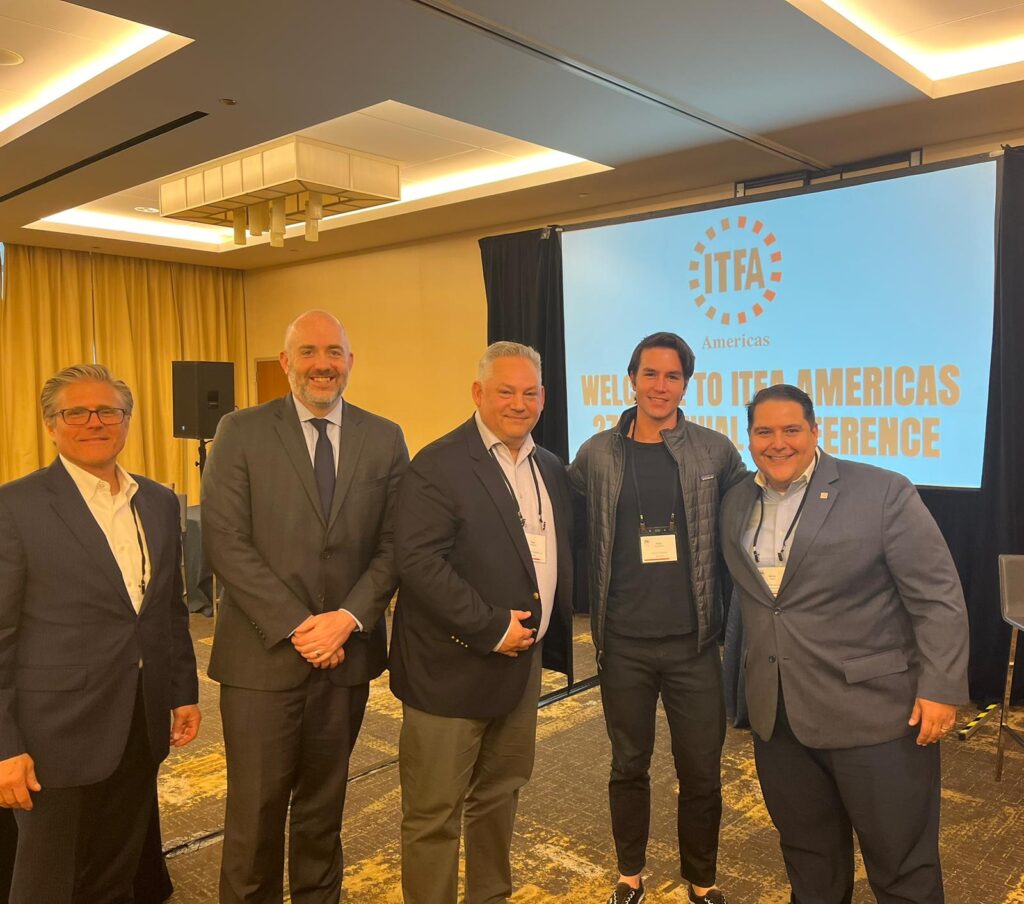-
 ITFA represents the rights and interests of banks, financial institutions and service providers involved in trade risk and asset origination and distribution.Our Mission
ITFA represents the rights and interests of banks, financial institutions and service providers involved in trade risk and asset origination and distribution.Our Mission
Contributed by the ITFA AMERICAS Committee, May 2024
For the first time in its history, ITFA Americas staged its annual conference in Chicago. Over 120 delegates attended the content-rich 3-day forum which began with two enlightening workshops and an annual general meeting. The workshops focused on the ‘interplay between bankruptcy, restructuring and credit’ (hosted by Dentons) and the Small Business Administration’s working capital initiatives, while the AGM saw Brendan Herley (Olea Global) and Harpreet Mann (Amynta) re-elected as Co-Chairs, Lisa Varney (Bondaval) re-elected as Vice Chair, and 4 newcomers elected to the advisory board: Alexandra Toskovich (Brown Brothers Harriman), Amable Bueno (Komgo), Sereen Ahmed (Barclays), Waheeb Rizvi (HSBC).
In keeping with tradition, the conference panel sessions began with an excellent overview of the geopolitical and macroeconomic landscape by two first-rate speakers: Robert Sockin (Citibank) and Steve Ricchiuto (Mizuho Bank). Opinions and outlooks differed – over whether or not the Federal Reserve will or should cut interest rates in 2024, the knock-on impacts on other central banks around the world, China’s economic prospects, the likelihood of a recession, and whether AI is helping or harming US productivity and inflation – but the audience was rapt.
Turning to Latin America, the panelists from Bank of America (Jean-Paul Antelo), Coface (Carolina Ventura), Cofine Trade Finance Solutions (Miguel Burelo) and SMBC (Nestor Mosquera) reminded us that the region as a whole is rising in economic prominence. In fact, the US imported more goods from Mexico in 1Q24 than it did from China. Such goods range from automobiles to tequila. In addition to Mexico, markets such as Brazil, Costa Rica and Guatemala have all attracted higher foreign investment in recent years, as has the Dominican Republic. But the panelists advised that investors should take a long-term view on the region before entering as ‘LatAm is a region for the brave.’
Given the importance of energy throughout the Americas, it was fitting to turn attention to the challenges and (potential) solutions of ‘energy transition in the US.’ Four insightful panelists from C2 Energy Capital (Richard Dovere), ECP Forestar (Britt Pinkerton), Hecate Grid (Bradley McCandless) and Vestas (Jenny Spaulding) informed the audience that despite rejoining the Paris Accord and implementing the Inflation Reduction Act, nowhere near enough progress or investment is materializing in the US energy markets. While technological advances abound, more could be done with much-needed capital. However, because ‘capital hates uncertainty,’ the panelists felt that progress is likely to remain slow.
Another big topic of discussion was ‘banking and the next decade of trade finance.’ To their credit, Dominic Capolongo (LiquidX), Sanjeev Ganjoo (Citibank) and Sereen Ahmed astutely outlined several key areas of service improvements by banks and non-banks. These included more funding options for SMEs (eg, PO financing, distribution finance), a continued growth in AR and inventory financing, more funders adopting originate-to-distribute models, stronger inter-connectivity between banks and fintechs, and digitization of documents. This is clearly an ongoing, multi-pronged evolution, and as one panelist said, rather like playing 3-D chess.
Returning to a more rudimentary level, our keynote speaker, Sonat Birnecker, shared her inspiring story as to how she and her husband started KOVAL Distillery in Chicago and, with support from the SBA, are now managing to export to over 50 countries.
Trying to solve the “SME Paradox” (funding gap) was also a subject for a broader panel discussion involving reps from Marco Financial (Peter Spradling), Rosenthal & Rosenthal (Peter Clement), the SBA (Dan Piche) and Wintrust (Tom Beube). Here, it should be kept in mind that there are over 33 million small businesses in the US that employ half of the labor force. As such, securing the right sort of funding is vitally important on both a micro and macro level. And the same principles apply in LatAm as it was stated that ‘a 1% rise in exports creates 500k jobs in textiles in Colombia.’ We will maintain our support for SMEs across the Americas.
The subjects of sanctions, tariffs and compliance are rarely considered to be fun. Nonetheless, the panel discussion relating the world of maritime transportation and ‘dark fleets’ was fascinating. David Tannenbaum (Blackstone Compliance) and Richard Chriss (ex-president of ASMCI) provided valuable historical and present context and left the audience wanting to know more.
Similarly, but less disturbingly, Andrew Chang (Santander) and Beth Prohow (MUFG) shared their perspectives on the expanding US supply chain finance marketplace. Facility sizes have grown, as has investor demand. Differences between ‘standardized’ and ‘advanced’ approaches to the business were clarified. Use of credit risk insurance is integral, especially when dealing with sub-investment-grade obligors. But ESG scoring is seemingly less important to US corporates than it is in Europe.
While many trade finance market participants look to banks for deal-flow, there is a growing number of ‘alternative’ deal originators and funding solution providers including Bondaval (Lisa Varney), Demica (Andrew Holmes), LSQ (Terry Ragsdale) and Raistone (Dave Skirzenski). This quartet made for an enjoyably interactive panel that is likely to warrant a follow-on discussion later in the year.
Friday morning began with a lively discussion on the world of commodities. But rather than focus on the geopolitics of oil production or today’s elevated spot prices for gold, copper or other precious metals, Andrea Moran (Frontieras North America), Deanna Reitman (Faegre Drinker) and Murat Askin (Staalx) exchanged views on the practical limitations of tax and fuel credits, the difficulties of creating a ‘global market’ to prevent fraud and market manipulation, the importance of securing title of ownership and enforcing market standards, and the impact of tariffs on feedstocks. Not surprisingly, the panel ran over time.
Many believe that automating archaic, paper-intensive practices will be a boon for trade finance. But where to start and how to implement technological change is easier said than done. For example, is it better to build a new platform in-house or buy a ‘white label’ solution from a proven market leader? According to CubeLogic (Natallia Hunik), Orbian (Paul Coles) and Pelican AI (Jim Logan), it would seem that ‘partnering with specialists’ makes for a better recipe for success. Not only can you customize and configure suitable programs more easily and affordably, but clients can also better prepare themselves for ‘lots of unexpected complexities and challenges’ (eg, data bias, hacking, multi-level data protection, etc). More on this subject soon.
The importance of partnership, transparency and consistently sharing key information with insurance partners was the takeaway message of the panel featuring Andre Python (FCIA), Maryam Kouhgoli (Deutsche Bank), Matt Dunne (Beazley) and Ryan Oehrle (SMBC). This ‘360-degree market overview’ also highlighted that premiums received in 2023 fell dramatically year-on-year despite underwriters quoting on a similar number of deals, there’s been a YoY rise in ‘single funding requests’, and that banks face increasing competition from non-banks for insurance coverage.
The digitization of trade documents – negotiable instruments as well as invoices and bills of lading – is a hot topic in the industry. But while the UK parliament approved the Electronic Trade Documents Act in September 2023, progress in the US has been much slower. In fact, fewer than 20 state legislatures have enacted policy so far with New York being one of the most important states still to be convinced. The expert panelists from Dykema (Chris Cahill), Mayer Brown (Rebecca Fruchtman) and Sullivan & Worcester (Mike Sullivan) exchanged views on the merits on possible timelines of ‘progress’ in the US while also remarking on other key topics such as Regulation Q and the messy business of bankruptcy claims and proceedings.
Closing the conference, Brooke McDevitt (Evolution Credit Partners), Camila Lemos (JP Morgan) and Ken Kozack (UBS O’Connor) remarked on today’s investor sentiment. For some, ‘trade provides outweighed returns’ which is why non-bank financial institutions are entering the market. That said, while private credit funds look to ‘buy decent but mispriced debt,’ commercial banks try to adhere to the wants and needs of their corporate clients. Both groups have different motivations but all participants are under capital pressure which, naturally, determines its investment or distribution strategy.
All told, ITFA Americas’ annual conference was a great success and not just because of the 17 members that sponsored the event. It was rich in content and sparked a lot of constructive collaboration. Thank you, Chicago.




Privacy Policy | Cookie Policy
Designed and produced by dna.studio